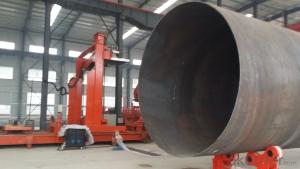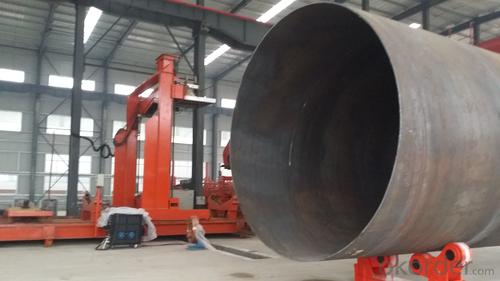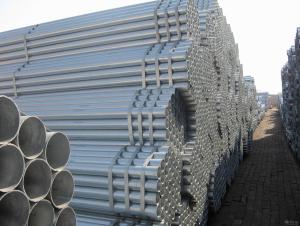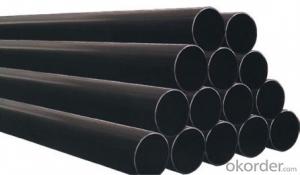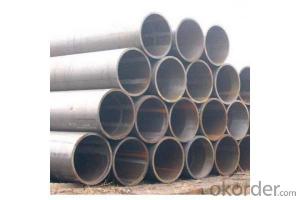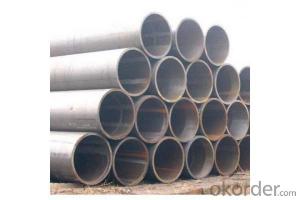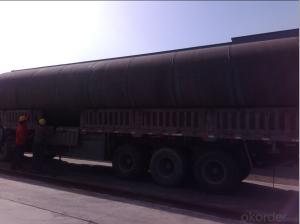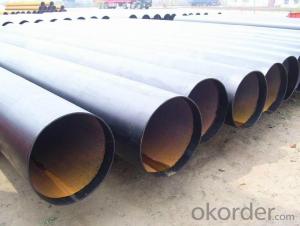18'' CARBON STEEL SSAW WELDED PIPE API/ASTM/JIS/DIN
- Loading Port:
- Tianjin
- Payment Terms:
- TT OR LC
- Min Order Qty:
- 5 m.t
- Supply Capability:
- 300 m.t/month
OKorder Service Pledge
OKorder Financial Service
You Might Also Like
Packaging & Delivery
Packaging Detail: | standard export packing or as customer's requirement |
Delivery Detail: | within 10 - 30 days |
Specifications
Spiral Welded Steel Pipes and Tubes
1.Material:Q195-Q235
2.Length:1-12m
3.WT:1.0-14mm
4.O.D.:20-273mm
Product Description:
1.Material : Q235,Q345,L245,L290,L360,L415,L450,L485,GrB,X42,46,X52,X56,X60,X65,X70,X80,X100
2,Standard: SY/T5037-2000,GB/T9711-2011,API Spec 5L PSL1/PSL2,ASTM A252\A53,ISO3183,DIN17172,EN10217,JIS G3457,AWWA C200,ASTM A139,ASTM A671,ASTM A672
3.Wall thickness: 3.0mm-30mm
4.Outer diameter: φ168mm-3020mm
5,Length: 5m-12m or as your requirement
6,Corrosion protection standard: DIN30670,DIN30671, AWWAC210, AWWA C203, SY/T0413-2002,SY/T0414-2002
7,Application: Oil, gas, natural gas, water pipe, thermal electricity pipe, steel structure engineering, etc
Q195-q345 Material Steel Pipe's Materials
Elements | Chemical Compsition% | Mechanical Property | ||||||
C% | Mn% | S% | P% | Si% | Yield Point (Mpa) | Tensile Strength(Mpa) | Elongation | |
Q195 | 0.06-0.12 | 0.25-0.50 | <0.050< span=""> | <0.045< span=""> | <0.030< span=""> | >195 | 315-430 | 32-33 |
Q215 | 0.09-0.15 | 0.25-0.55 | <0.05< span=""> | <0.045< span=""> | <0.030< span=""> | >215 | 335-450 | 26-31 |
Q235 | 0.12-0.20 | 0.30-0.70 | <0.045< span=""> | <0.045< span=""> | <0.030< span=""> | >235 | 375-500 | 24-26 |
Q345 | <0.20< span=""> | 1.0-1.6 | <0.040< span=""> | <0.040< span=""> | <0.55< span=""> | >345 | 470-630 | 21-22 |
Packaging & Delivery
Packaging Detail: | Normal exporting packing,in container or bulk vessel or as per clients' request |
Delivery Detail: | 2 months after confimed contract |
Specifications
Large Diameter API 5L X70 PSL2 LSAW Steel Pipe
Grade: X42, X46, X50, X52, X60, B, C
OD: 1.5"-28"
WT: SCH10-SCH160
Brand:TPCO
Large Diameter API 5L X70 PSL2 LSAW Steel Pipe
Specifications:
u Standard: API 5L
u Grade: B, C, X42, X46, X50, X52, X56, X60, X65, X70, X80
u OD: 1.5"-28"
u WT: SCH10-SCH160
u Length: 5-12m
u Ends Finish: plain end, bevel end, grooved end
u Surface Treatment: bare, black varnished, oiled finish, red color, anti-corrosion, 3PE, FBE or epoxy coating
u Technique: hot rolled or cold drawn
u Application: api 5l steel pipe for conveying oil, water, gas
u Invoicing: based on theoretical weight or actual weight
u Payment Terms: L/C at sight, T/T or Western Union
u Trade Terms: FOB, CFR, CIF
u Certification: ABS manufacturing assessment, ABS design assessment, API 5CT, API 5L, DNV manufacturer certificate, ISO9001 quality management system certificate, ISO14001 environment management system certificate, GB/T28001 occupational health and safety management system certificate, A1 class manufacturing license of special equipment certificate, CCS, GL, LR, SGS, TüV, PDE
- Q: What are the different sizes of steel pipe nipples?
- The sizes of steel pipe nipples vary depending on their intended use and application. Common sizes include 1/8", 1/4", 3/8", 1/2", 3/4", 1", 1 1/4", 1 1/2", and 2". However, there are many other sizes available to cater to specific needs and requirements.
- Q: What is the difference between carbon steel and stainless steel pipes?
- The main difference between carbon steel and stainless steel pipes lies in their composition and corrosion resistance. Carbon steel pipes are primarily made of iron and carbon, while stainless steel pipes contain iron, carbon, and a minimum of 10.5% chromium. This chromium content in stainless steel provides excellent corrosion resistance, making it more suitable for applications where pipes may come in contact with moisture or corrosive substances. Carbon steel pipes, on the other hand, are more cost-effective and commonly used in applications where corrosion resistance is not a primary requirement.
- Q: What are the different types of steel pipe coatings for underground gas pipelines?
- There are several types of steel pipe coatings commonly used for underground gas pipelines, including fusion-bonded epoxy (FBE) coating, polyethylene (PE) coating, and polyurethane (PU) coating. Each coating provides different levels of protection against corrosion and abrasion, ensuring the longevity and integrity of the gas pipeline.
- Q: How are steel pipes used in stadium construction?
- Steel pipes are commonly used in stadium construction for various purposes such as structural support, plumbing systems, and the installation of lighting and audio equipment. They provide strength, durability, and versatility, making them ideal for ensuring the overall stability and functionality of the stadium.
- Q: What is the difference between hot-dip galvanizing and electroplating for steel pipes?
- Hot-dip galvanizing and electroplating are two common methods used to provide corrosion protection for steel pipes, but there are key differences between the two processes. Hot-dip galvanizing involves immersing the steel pipes into a bath of molten zinc, which forms a metallurgical bond with the steel. This results in a thick and durable zinc coating that provides excellent corrosion resistance. The process of hot-dip galvanizing creates a uniform coating that covers the entire surface of the steel pipe, including both the external and internal surfaces. This makes hot-dip galvanizing particularly effective for protecting both the inside and outside of the pipes. On the other hand, electroplating is a process that involves the deposition of a thin layer of metal onto the surface of the steel pipes using an electric current. In the case of electroplating for steel pipes, typically a layer of zinc is applied. Unlike hot-dip galvanizing, electroplating does not provide a metallurgical bond between the zinc and the steel. Instead, it creates a mechanical bond, which is not as strong or durable as the bond formed through hot-dip galvanizing. The electroplated zinc layer is thinner compared to hot-dip galvanizing, which means it may not provide the same level of corrosion protection. Another difference between hot-dip galvanizing and electroplating is the application process. Hot-dip galvanizing requires immersing the steel pipes into a bath of molten zinc, which can be a time-consuming process. Electroplating, on the other hand, involves applying the zinc coating through an electrolytic cell, which can be faster and more efficient. In summary, the main difference between hot-dip galvanizing and electroplating for steel pipes lies in the thickness and durability of the coating, as well as the bonding mechanism between the zinc and the steel. Hot-dip galvanizing provides a thicker and more durable coating with a metallurgical bond, making it more effective for long-term corrosion protection. Electroplating, on the other hand, creates a thinner coating with a mechanical bond, which may be suitable for applications requiring a less robust level of corrosion resistance.
- Q: How are steel pipes used in the construction of railways and transportation systems?
- Steel pipes are used in the construction of railways and transportation systems primarily for their durability and strength. They are utilized for various purposes such as the fabrication of tracks, bridges, tunnels, and support structures. Steel pipes provide a reliable and long-lasting solution for the transportation industry, ensuring the safety and efficiency of railway systems.
- Q: How do steel pipes perform in earthquake-prone regions?
- Steel pipes perform well in earthquake-prone regions due to their high strength, durability, and flexibility. The inherent properties of steel, such as its ability to absorb energy and distribute stress, make steel pipes resistant to seismic activity. Additionally, steel pipes can be designed and installed with specific measures to further enhance their seismic performance, ensuring the safety and reliability of infrastructure in earthquake-prone areas.
- Q: How do steel pipes handle abrasive materials?
- Steel pipes are highly resistant to abrasion and can effectively handle abrasive materials. The durable nature of steel allows it to withstand the erosive forces caused by abrasive particles, preventing damage and maintaining structural integrity. Additionally, steel pipes can be further protected by applying coatings or linings, enhancing their ability to handle even the most abrasive substances.
- Q: Can steel pipes be used for underground power transmission?
- Indeed, underground power transmission can make use of steel pipes. Due to their resilience, robustness, and resistance to corrosion, steel pipes are extensively employed in underground power transmission systems. These pipes serve as a safeguarding enclosure for power cables, guaranteeing their security and shielding them from potential harm caused by external elements like moisture, soil movements, and potential impacts. Moreover, the use of steel pipes facilitates easy installation, maintenance, and repair of the power transmission system. Additionally, their ability to withstand high pressure and temperature renders them suitable for conveying the high voltage electricity essential for power transmission. All in all, steel pipes are a dependable and effective choice for underground power transmission.
- Q: How are steel pipes used in bridge construction?
- Steel pipes are commonly used in bridge construction as piling or foundation elements. They are driven into the ground to provide support and stability to the bridge structure. Additionally, steel pipes can be used as structural members in the bridge's superstructure, such as for the construction of bridge piers or trusses, due to their high strength and durability.
Send your message to us
18'' CARBON STEEL SSAW WELDED PIPE API/ASTM/JIS/DIN
- Loading Port:
- Tianjin
- Payment Terms:
- TT OR LC
- Min Order Qty:
- 5 m.t
- Supply Capability:
- 300 m.t/month
OKorder Service Pledge
OKorder Financial Service
Similar products
Hot products
Hot Searches
Related keywords
